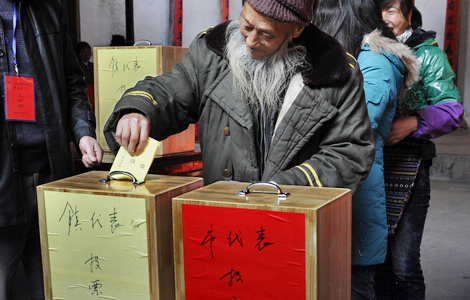 |
|
|
|
|||||||||||
SHENYANG - Northeast China's Liaoning province is poised to implement the most stringent regulations in its history to address the over-exploitation of groundwater.
Liaoning provincial government announced on Wednesday that it will strengthen administration of groundwater use. These regulations are mainly focused on limiting the total use of groundwater and increasing water-use efficiency.
By 2015, the province will shut down all of the region's underground water projects except for those used in emergencies, according to a plan made by local authorities. A total of nearly 3,800 existing projects will be closed, which will prevent the extraction of more than 1.2 billion cubic meters of underground water in the following years.
"All new groundwater drilling projects are prohibited, and the current ones are all required to be closed, except the emergency water supply," said an official surnamed Li from the Liaoning water resources department.
Official data shows that Liaoning has had a shortage of water supply for long and its annual extraction of underground water is greater than most Chinese provinces.
Its annual extraction of groundwater has reached 6.74 billion cubic meters. The rapid depletion of groundwater has caused severe consequences, including saltwater intrusion and sinkholes.
Take Dalian, a port city in the province, for example. Overuse of water has caused salt water to intrude into local groundwater, which has led to contamination of drinking water. Experts have yet to find a solution.
Liaoning is not the only place in China that suffers from groundwater over-exploitation. Early this January, China Geological Environmental Monitoring Institute published a report saying groundwater over-exploitation and the subsequent decay are mainly responsible for geological dangers in eastern and central China.
But experts argue that enforcing these measures is rather hard, though leaders at various levels will be held accountable.
"Local governments are asked to reduce water consumption and simultaneously develop their economies without further depleting the groundwater table. This is very challenging," said Ma Jun, director of the Institute of Public and Environmental Affairs, a non-governmental organization.
The economic development of Liaoning largely depends on heavy industries, including iron and steel smelters and oil production plants, which are top consumers of underground water.
Xiao Wang, a forge worker at a local iron and steel company, said that production uses up tons of groundwater every day.
"I do not think we will give up the exploitation, because this is saving costs and is necessary. The regulations will result in rising costs in the end," Wang said.
Experts suggest that follow-up work needs to be carried out to make the proposed measures more effective.
"We cannot sacrifice the environment for money. But the government should do more work to help industries to adapt to the change rather than imposing rigid regulations," said economics professor Shao Jianbing of Liaoning University.
Xinhua contributed to this story.
Wu Ying, iPad, Jeremy Lin, Valentine's Day, Real Name, Whitney Houston, Syria,Iranian issue, Sanyan tourism, Giving birth in Hong Kong, Cadmium spill, housing policy

|

|

|

|

|

|